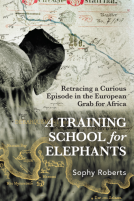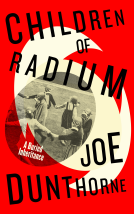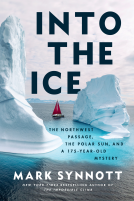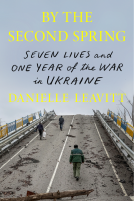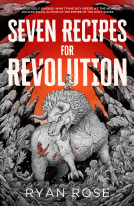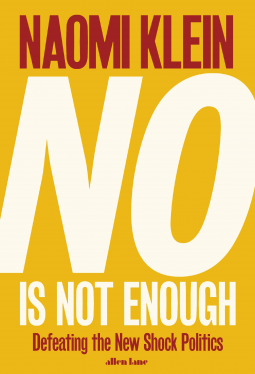
No Is Not Enough
Defeating the New Shock Politics
by Naomi Klein
This title was previously available on NetGalley and is now archived.
Send NetGalley books directly to your Kindle or Kindle app
1
To read on a Kindle or Kindle app, please add kindle@netgalley.com as an approved email address to receive files in your Amazon account. Click here for step-by-step instructions.
2
Also find your Kindle email address within your Amazon account, and enter it here.
Pub Date Jun 13 2017 | Archive Date Sep 11 2019
Penguin Books (UK) | Allen Lane
Description
'This is a look at how we arrived at this surreal political moment, how to keep it from getting a lot worse, and how, if we keep our heads, we can flip the script.'
Naomi Klein - award-winning journalist, bestselling author of No Logo, The Shock Doctrine and This Changes Everything, scourge of brand bullies and corporate liars - gives us the toolkit we need to survive our surreal, shocking age.
Remember when love was supposed to Trump hate? Remember when the oil companies and bankers seemed to be running scared? What the hell happened? And what can we do about it?
Naomi Klein shows us how we got here, and how we can make things better.
No Is Not Enough reveals, among other things, that the disorientation we're feeling is deliberate. That around the world, shock political tactics are being used to generate crisis after crisis, designed to force through policies that will destroy people, the environment, the economy and our security. That extremism isn't a freak event - it's a toxic cocktail of our times.
From how to trash the Trump megabrand to the art of reclaiming the populist argument, Naomi Klein shows all of us how we can break the spell and win the world we need. Don't let them get away with it. '
An ordinary person's guide to hope. Read this book' Arundhati Roy
'As accessible as it is brilliant, No is Not Enough is an essential blueprint for a worldwide counterattack' Owen Jones
'Who better than Naomi to make sense of this madness, and help us find a way out? A top-of-the-stack must read' Michael Stipe
'Naomi Klein's new book incites us brilliantly to interweave our No with a programmatic Yes. A manual for emancipation' Yanis Varoufakis
'Magnificent ... a courageous coruscating counterspell' Junot Díaz
Advance Praise
‘Urgent, timely, and necessary’ Noam Chomsky
‘Naomi Klein constructs a common story that allows us to sustain the effects of being shocked. We can act upon that, with intelligence and happiness, to recover our world’ Gael García Bernal
‘A genuine page-turner – highly engaging and provocative – and provides a fascinating lens through which we can view our current moment. Klein is not preaching to the choir, but framing the moment, connecting necessary dots, and outlining the challenge that lies ahead in clear terms that anyone can understand’ Michelle Alexander, author of The New Jim Crow
‘Saying No to their shock doctrine is essential but insufficient. Naomi Klein’s new book incites us brilliantly to stiffen our lip, to overcome quickly their calculated shocks, and to interweave our No with a programmatic Yes. It is a manual for emancipation by means of the only weapon we have against orchestrated misanthropy: constructive disobedience’ Yanis Varoufakis, former Finance Minister of Greece
Available Editions
| EDITION | Paperback |
| ISBN | 9780241320884 |
| PRICE | £12.99 (GBP) |
| PAGES | 288 |
Featured Reviews
'The left-wing almost-wins of the past two years are not defeats. They are the first tremors of a profound ideological realignment from which a progressive majority could well emerge - just as geopolitically significant as the rise of authoritarianism and neo-fascism on the right side of the spectrum.'
Although this has been driven locally by Trump's election, Klein's analysis has global relevance outside of the US. While much of the book is a depressing analysis of how neoliberalism has fostered greed, division, hatred, exploitation and the privatisation of the state leading almost inevitably to a Trump (who Klein wonderfully describes as 'dystopian fiction come to life'), the point of her polemic is far more optimistic than this: 'It's becoming possible to see a genuine path forward - new political formations that, from their inception, will marry the fight for economic fairness with a deep analysis of how racism and misogyny are used as potent tools to enforce a system that further enriches the already obscenely wealthy on the backs of both people and the planet'.
Ultimately, what Klein is advocating (and she's been involved in establishing a groundwork for this to happen) is a progressive alliance that brings together activists whose aims might not necessarily immediately seem to be linked (green activists, campaigners for increased minimum wages, anti-racist and gender/sexuality rights groups, as a few examples) but which, as she shows, all struggle with the manifestations of a dominant and institutionalised system.
Klein, as usual, is loud and angry (and rightfully so) but she channels her rage into something positive. She's also put her finger on something in the zeitgeist: the book was written after the Brexit vote but before the June 2017 General Election and so there's something very prescient in her statement:
'What for decades was unsayable is now being said out loud by candidates who win millions of votes: free college tuition, double the minimum wage, 100 percent renewable energy as quickly as technology allows, demilitarise the police, prisons are no place for young people, refugees are welcome here, war makes us all less safe.'
What I like about this book is that it moves on from resistance to positive action. As usual, it'll probably be preaching to the converted but the blueprint for a united, progressive alliance is surely the optimistic direction that we need to take, together.
Posted on Amazon and Goodreads
 Olga N, Reviewer
Olga N, Reviewer
Thanks to NetGalley and to the publisher, Penguin Books UK-Allen Lane, for providing me with an ARC e-copy of this book that I freely chose to review.
I have a long list of books to read and I am trying to organise it somehow, mostly in order of acquisition, but this book arrived just as I had finished reading another book and it stuck in my mind. It is a very current and momentous book, so it was for the best that I read it promptly.
I am familiar with the name of Naomi Klein and I have seen many of her books and read about her and her ideas, but this is the first book I have read by her (I have read some short articles but although I kept seeing books by her that sounded interesting, it was usually when I was doing research on an unrelated topic or at a time when I could not read them and this time I grabbed the opportunity).
The book builds on much of her previous work, particularly on the issue of brands and how they have come to dominate our lives (the subject of No Logo) and also how politics and politicians exploit any disasters and shocks to impose ever harsher neo-liberal economic policies (that she discusses in The Shock Doctrine: The Rise of Disaster Capitalism) and applies it to the current situation, particularly to Trump’s election and his policies since.
I started highlighting text through the book, to the point that sometimes I would be doing something and listening to the text to speech version and would have to stop to highlight something. This happened very often and I realised Klein was saying many of the things I had been thinking and some that I had not thought of but I recognised and agreed with as I read them. Her reflections about Trump as a brand and his presidency as the latest feather to add to this brand made sense (I learned new things about him and was reminded of others that had long forgotten but helped to build up a clear picture). It was curious that she referred to his time in the Apprentice and his appearances in WWE (televised professional wrestling) as (in a certain way) training for what was to come. She noted that some of his behaviours during the campaign were very similar to those of the fighters in WWE. And lo and behold, a few hours after I had read that part of the book, Trump tweeted the doctored video of one of his appearances in the WWE putting the CNN logo instead of the head of Vince McMahon, whom he was pretending to punch. And if I had already thought that was a very convincing comparison when I read it, even more so now.
The book is well-written, easy to read (well, or not, depending on what your point of view and your political leanings are), and develops the thesis that although many are shocked by Trump’s rise to power (and Brexit), it was not a total surprise, and there are people, organisations, and even whole countries who have resisted the move towards materialism and brands where only things, money, and profits matter, and where fingers are pointed at sectors of the population (immigrants, asylum seekers, ethnic minorities, women, environmentalists…) who become the scapegoats for a situation they are the victims of. Klein looks at many of these groups and populations and how they have resisted the situation and taken a stand but she also notes that something else is required. Resisting and saying no is important, and it does not matter how big or small we are, we can all do it, but we need to find something to aim for, something that can unite us and something we can fight together for.
She discusses in detail the importance of trying to find common ground, rather than working for small goals, and states that the way the political centre has tried to introduce minor changes will not suffice. As an example of what could be done she focuses on the meeting that took place in Canada, bringing many groups together (unions, environmentalists, indigenous people, women’s groups, groups working towards racial equality…) and that produced the Leap Manifesto, because they think a leap is required to truly change things. We must leap towards hope and dare to embrace a revolutionary way of changing the world.
She notices the rise of dystopian fiction (and films) and the ever growing popularity of some classics (Orwell’s 1984) that she observes are a warning (not necessarily a prediction) and says we need more utopias; we need to be able to think of a better future. And she writes (and as she quotes a big favourite of mine, Oscar Wilde, I could not resist sharing it):
Because, as Oscar Wilde wrote in 1891, “a map of the world that does not include Utopia is not worth even glancing at, for it leaves out the one country at which Humanity is always landing. And when Humanity lands there, it looks out, and, seeing a better country, sets sail.”
I read some of the comments on the book, and they are separated along ideological lines. I agree that perhaps she uses examples that might not be as simply black or white as she makes them sound, and I also agree (and thought the same as I read it), that perhaps the Leap Manifesto falls short of going as far as it should (as it offers and statement of good intentions but not much in the way of implementation) although it is an attempt at reaching an agreement and a compromise between very different groups, so it is not surprising that it is not all that radical. I must clarify that I read an ARC copy and therefore did not have access to what I have read are very extensive notes at the end of the final version of the book. Without the notes, it is not a very long book.
The book made me think of an essay we had to write, when I was studying American Literature at the University of Sussex, discussing what could have been done, or rather, what could be done in the present, to somehow repair the gap between whites and African Americans in the US that comes from the time of slavery and was discussed after the Civil War and the freeing of all slaves, a gap that has never been fully resolved (as we all know). At the time of the Reconstruction, the suggestion had been that each freed slave be given 40 acres of land (therefore redistributing the slave owners’ property) and a mule (if you’ve ever wondered why Spike Lee’s production company is called that and never checked, now you know) so they could build up a life for themselves. Of course, that did not happen (or only in few cases) but I remember that after talking to the professor I did write a somewhat utopic essay that he could not fault for its reach, although he could not see how any government would go down that route. (I’ve been looking for it but I think it must have been in one of the floppy disks that disintegrated, although I might have a paper copy. I’ll investigate). It also made me think about how much emphasis on brands is made, even in the world of writing, and how a lot of the advice to sell anything (a physical product or anything else) is to create a brand and market yourself (rather than the product). As she notes, if you are swimming in the world of media, in whatever capacity, it is very difficult not to be swamped by the allure of branding and its fraught logic. This is something that I have been thinking more and more about recently, and something that I care for less and less. Yes, perhaps this book arrives at the right moment, at least for me, but hopefully for many others too.
As I said, I highlighted a lot of content, and of course, I cannot share it all. But I could not resist and had to share a few bits.
First, one that shows her wit (and that made me write: olé! as a comment)
The truth, which doesn’t sound nearly as glamorous, is that the Trump brand stands for wealth itself or, to put it more crassly, money. That’s why its aesthetics are Dynasty-meets-Louis XIV. It’s why Trump’s relationship to gold is the inverse of Superman’s relationship to kryptonite: Trump crumples when he is more than three feet away from something big and shiny.
This one I think will give you an idea of what the book is about, in her own words:
We have to question not only Trump but the stories that ineluctably produced him. It’s not enough to superficially challenge him as an individual, foul and alarmingly ignorant though he may be. We have to confront the deep-seated trends that rewarded him and exalted him until he became the most powerful person in the world. The values that have been sold to us through reality TV, get-rich-quick books, billionaire saviors, philanthrocapitalists. The same values that have been playing out in destroyed safety nets, exploding prison numbers, normalized rape culture, democracy-destroying trade deals, rising seas and privatized disaster response, and in a world of Green Zones and Red Zones.
And I love the way she ends the book (do not worry, it is not a spoiler):
My deepest thanks are for patient little Toma, who missed his mom over these last months, but feels strongly that, “Donald Trump is too rude to be president.
This book is not for everybody and if you really like Trump and what he stands for, or do not care about climate change and other issues such as the rights of women, equality, diversity, the rights of indigenous people… I’d advise you not to read it. If you don’t, I’d recommend you check a sample of the writing and see if it speaks to you. I now know why she is so well-known and respected. A compelling writer, whatever one’s political views.
 Ellen T, Reviewer
Ellen T, Reviewer
"A map of the world that does not include Utopia is not worth even glancing at, for it leaves out the one country at which Humanity is always landing. And when Humanity lands there, it looks out, and, seeing a better country, sets sail. Progress is the realisation of Utopias."
This quotation is not actually Naomi Klein's, but Oscar Wilde's which she cites in the final section of 'No Is Not Enough.' Although it's odd to start a review at the end, it feels right. Because that's what really feels at the heart of this book. And, as it's non-fiction, it's not as if there's a spoiler.
Anyway, let's rewind. Before this, I'd heard of Klein as a journalist vaguely but had never read any of her work. Seeing this, I grasped upon it; feeling, like many of us, the need for something that could tell us what we can do in this crisis driven world with a 'kleptomaniac thug' leading one of the most powerful countries in the world. Someone to tell us there is hope.
And Klein has done that.
The book is, broadly, broken into three stages: how the hell did we get here?; what's happening and may happen in the near future; and what we can do.
The first section gave me real insight into how Donald Trump actually became elected. It's something that, as a non-American, I just haven't been able to get my head around. But, Klein's writing explains it very clearly: it's actually something we could have predicted. (In fact, many had.) Trump, with zero political experience, has the one big powerful thing that everyone in the world wants: money. And lots of it. In fact, the name 'Trump' is a brand in itself. There is a lot of depth about the Trump brand representing quality and luxury, whilst in fact it offers that for the very privileged few, leaving the rest to dangerous neglect and abuse. Things like 'Trump Towers' make more sense to me now; Trump attaches his name to things, and lets the companies get on with it. Then, as is often the case, something is discovered that means the company is abusing workers' rights or similar, Trump can raise up his hands in theatrical surprise and say: 'I never knew that was happening. It was all down to other people, I wouldn't have sanctioned it.' No Mea Culpa for Trump.
Klein explains that many of the scandalous policies that have been brought through in the last few decades are because of 'shock politics.' (Indeed, she has an entire book written about it which I'm tempted to read... when I get through everything else on my list!) There is some disaster, whether environmental or human made (or both, because they are becoming increasingly difficult to prise apart) that lets governments make snap rulings that are passed purely because of the 'disaster in action.' When the disaster abates, the policies stand, meaning they have managed to get in some controversial battle won without a fight. It feels like being kicked when you're already down.
I learnt a lot from this book, particularly about the men that Donald Trump has surrounded himself with; looking at his cabinet, they are all rich, white men with huge companies that stand to gain through lower taxes and less public reform. In fact, each of his cabinet members have their own sort of 'brand.' This means that, for the Trump administration, any disaster that happens is actually a blessing. If there's a shooting at a school, that means they can target people and profit from it. I'm making it sound too simplistic, but Naomi Klein is a much better political writer than I! In other words, disasters of any type are opportunities for the American government as it stands. And that is such a frightening prospect. Looking at the things Trump has already done whilst in office just six months leaves little room to hope he is going to be anything but exploitative, whilst putting himself, Trump, as Number One.
I won't go into any more depth of the politics behind this book, because I am truly unable to do so. But also, I'd like people to read it themselves. This should almost be compulsory reading. It's so acutely topical, and the fact that she managed to publish it so quickly is amazing. It's what we need to read right now.
Because, as title says No Is Not Enough. In the final section, Klein tackles this head on. It's all very well to say what we don't want (a dystopian world with a kleptomaniac thug leading the way), but we need to offer an alternative. We need to start saying Yes.
On finishing the book, I felt a real surge of hope. In Canada (Klein is Canadian, not American) a summit was held with people of all different backgrounds - trade unionists, Indigenous people, Black Lives Matter, marginalised communities, environmentalists, scientists, journalists, Democrats - to unite and come up with an alternative. Because, actually, all these problems are linked. Climate change will mostly effect marginalised communities, Indigenous peoples and black people. Jobs need to be created in a new 'green' way. And not just to do with green energy. They class anything 'green' as something that does not contribute to fossil fuel burning. So, being a nurse, a teacher, a care-worker - all these are 'green' jobs, and these are the jobs that are being held so precariously. Of course, there was a lot of debating and concessions and compromises to be made: no one could be entirely happy. But they came forward with a manifesto, written by the people, not by the politicians: The Leap Manifesto. Because the gap we have before warming creates insurmountable dangers is very small; we can't talk about 'baby steps' any more. We have to make a huge change.
And, as Klein says, we should refuse 'to be afraid, no matter how much we are tested... How we respond to this crisis is up to us... Let's leap.'
The Postscript contains the entirety of The Leap Manifesto, and don't skip this bit. (It's not long.) It's worth reading.
This was a great book, or journalistic piece of writing, and I implore you to read it. I hope that it is only relevant for a short period of time, that's all we can hope.
Thank you to NetGalley for providing an ARC.
Explosive, at times traumatizing and frustrating but ultimately hopeful - Naomi Klein's extensive knowledge and wealth of experience exudes in this mighty manifesto. Her anecdotes are both heartfelt and moving juxtaposed with endless hard-hitting facts, she's a master in her field and an appropriate figure attempting to initiate a global grassroots movement against ecocidal capitalism and right wing populism. This book, unlike her other works, feels much more personal as she states she didn't spend years researching, but it feels very much like a response to growing anger. That being said, it is still well structured and the arguments are coherent. A truly politically-shifting book.
I liked this book because, mostly, it allowed me to understand as a non U.S. citizen, why trump won the election, but overall why democrats and Hillary loosed. The theme about huge multimillionaires companies and shock doctrine are also presents, as they have a big role in trump campaign (fake news etc.etc.) but there are also some sort of solutions or wannabe solutions to apply before it's too late. As usual, after reading one of her book, I'm pretty convinced it is already too late.
La cosa che piú mi é piaciuta di questo libro, é che mi ha permesso, da cittadina europea, di comprendere cosa ci sia dietro la vittoria di trump, o per dirla meglio, dietro la sconfitta dei democratici e di Hillary. Il temi delle multinazionali e della dottrina dello schock sono sempre presenti (e come potrebbe essere altrimenti considerate le fake news di trump), ma ci sono anche delle ipotesi di soluzioni che l'autrice auspica vengano messe in atto prima che sia troppo tardi. Come sempre mi capita dopo aver letto un suo libro, sono convinta che sia giá, ormai, troppo tardi.
THANKS TO NETGALLEY FOR THE PREVIEW!
Another brilliant, anry and heartfelt, but thoughtful, cry about how we live our lives and what we can do to change them and the world, for the better.
 Mandy J, Reviewer
Mandy J, Reviewer
Insightful as always, Naomi Klein’s reaction to Trump’s presidency is both thought-provoking and provocative. Written in just months after the election it’s a powerful call-to-arms and a synthesis of much of her earlier work, in particular The Shock Doctrine, where she analysed the use of crises to further political agendas. In No Is Not Enough she brings together all her previous targets (brands, corporate hegemony, climate change and so on) and warns the reader that we should be aware of and vigilant about the shock tactics employed by Trump in which he exploits crises in order to impose his policies. She points out that Trump’s victory shouldn’t have been a surprise to anyone as it was the logical conclusion to America’s love affair with celebrity and wealth. But just saying no is not enough, merely resisting is not enough. The opposition needs a viable agenda to fight back and in the latter part of the book she expounds her vision of what a united opposition with clear and achievable policies could do for our world. I found this an absorbing and convincing book and even took away from it a shred of hope for the future. Maybe all is not completely lost. A must-read for anyone who cares about the mess we seem to be in and who wants to do something about it.
 Reviewer 196275
Reviewer 196275
Fantastic, educational, realistic, uplifting, life changing.
 Reviewer 247162
Reviewer 247162
Fascinating insights, a real contemporary read to be informed about today's events.
 Reviewer 386665
Reviewer 386665
Good, sometimes rallying sometimes a bit bleak. Not to sure about the whole Bernie Sanders thing..
 Steven P, Reviewer
Steven P, Reviewer
A book of two halves i suppose.
The first section is good , very thorough about the condition of the world not as deep or as savage on any section as other writers but a great primer on the state of the world from a left perspective.
The second section is the reason this book is good , Klein says these are the problem and lays down a roadmap showing how the world can escape the position it is in . It is well written beautifully argued and inspiring which is not always the case in books from the left about the world today .
 Reviewer 331638
Reviewer 331638
Naomi Klein wrote this book very quickly, in just five months, because she wanted to come out before any major crisis hits the United States, although Trump himself and his administration can really be considered as a major crisis. In No its not enough, Klein summarises her previous works, No Logo, and The Shock Doctrine, to explain how Trump exploited the conventions of reality TV, along with his personal brand, to become the president of the United States. Trump is not a leader, he is a promoter and protector of a brand at America’s expense.
As disastrous as the Trump policies are so far, the worst is yet to come, says Naomi Klein. He and the people around him are very open of what they want to do, in terms of human rights, immigration, crime, health, and climate change. We have already seen Trump’s respond to the London and Manchester attacks. We need to get ready for shock politics, argues Klein.
No It Is Not Enough, was marketed as a blueprint for resistance. I think is much more. It is a call for a progressive alliance, a call for collaboration and cooperation against, not a person (Trump), but a system (Trumpism). I was particularly intrigued by Canada’s Leap Movement, the values, positiveness, inclusiveness, diversity, and the hope it brings.
Despite the writing rush and the repetition of some of the themes, it is an excellent and useful book.
 jane l, Educator
jane l, Educator
As a Trump obsessive, this was a no-brainer for me; I devour everything I can on him because I am appalled that he has managed to rise so high and always interested to find out why. Klein does a creditable job here of investigating the manifold reasons for Trump's presidency and since I hadn't read her previous writings on shock doctrine and corporations, it was all quite new and informative.
She presents her material in a really user-friendly way for people who are intelligent but not necessarily well-versed in geopolitics, or at least who weren't until Trump! Well-researched, wide-ranging and very topical, of course, it will be fascinating to see how many of her predictions come true in the next few years.
The trouble is, hardly anyone who needs to read this, will do so, any more than I will read the Milo Yiannopolis book. Klein talks about echo chambers and silo politics, and I agree with her, but despite my interest in learning about what's going on in the US right now, I can't seem to make myself read 'the other side'. Until I do, I can't imagine 'the other side' will read 'ours'.
 Kim R, Reviewer
Kim R, Reviewer
Bit of a scary read in this day and age but a good one nonetheless.
 Librarian 250745
Librarian 250745
The politics of the West is in shambles precisely because we suffer ourselves to be less informed and more nonchalant while embracing a 'fast food' bite size mentality culture. This book explains why we need to be definite not only in what we don't want but in what we do want. We need to be active and engaged. It's a clear, straight forward and powerful.message which should be read by everyone.
Readers who liked this book also liked:
Publishers Lunch
General Fiction (Adult), Nonfiction (Adult), Teens & YA
